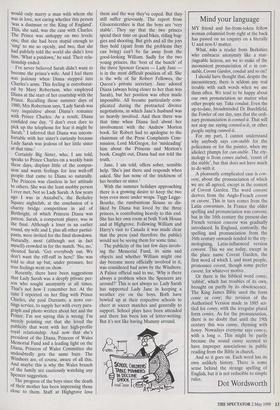Mind your language
MY friend and far-from-token fellow woman columnist from right at the back has passed on an enquiry on a literally U and non-U matter.
What, asks a reader from Berkshire who embraces anonymity like a mar- riageable heiress, are we to make of the inconsistent pronunciation of o in con- stable, Covent Garden, conduit and so on?
I should have thought that, despite the inconsistency, there is seldom any real trouble with such words when we use them often. We tend to be happy about our own pronunciation no matter what other people say. Take conduit. Even the up-to-date, broadminded Dr Burchfield, the Fowler of our day, says that the ordi- nary pronunciation is conned-it. That will not stop me saying conned-u-it, or other people saying cunned-it.
For my part, I cannot understand why anybody says con-stable for the policeman or for the painter, when my idiolect plumps for cun-stable. The ety- mology is from comes stabuli, 'count of the stable', but that does not have much to do with it.
A pleasantly complicated case is con- vent, about the pronunciation of which we are all agreed, except in the context of Covent Garden. The word convent derives from the Anglo-French covent or cuvent. This in turn comes from the Latin conventum. In France the older spelling and pronunciation was convent, but in the 16th century the present-day French version couvent was gradually introduced. In England, contrarily, the spelling and pronunciation from the 16th century onwards tended to the ety- mologising, Latin-influenced version convent. This we use today, except in the place name Covent Garden, the first word of which I, and most people, pronounce covent, though some prefer cuvent, for whatever motive.
Or there is the biblical word coney, `rabbit', which has troubles of its own, brought on partly by its obsolescence. The King James Bible used the form conie or cony; the revision of the Authorised Version made in 1885 set- tled for coney, with the irregular plural form conies. As for the pronunciation, there is no doubt that until the 19th century this was cunny, rhyming with honey. Nowadays everyone says cone-y, with a long o. This might be partly because the sound cunny seemed to have improper associations in public reading from the Bible in church.
And so it goes on. Each word has its own unlikely history. There is some sense behind the strange spelling of English, but it is not reducible to simple rules. Dot Wordsworth


























































 Previous page
Previous page